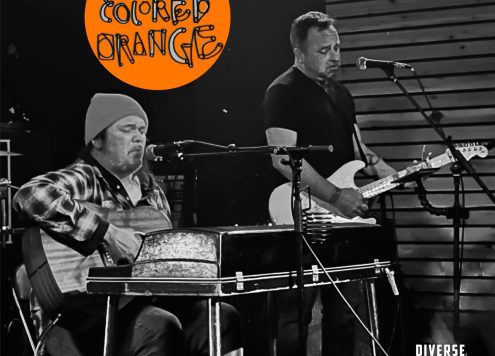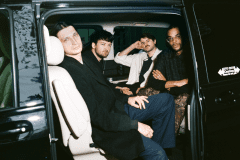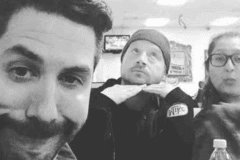Despite what all the boring parents of the world might have told you, playing in a band can actually teach you an incredible amount of professional and life skills. There aren’t likely many stronger case examples to this than Jarrod Montague, former Taproot drummer turned Vice President of a Fortune 500 Company. He passes along his knowledge and life experiences in the hopes that others can benefit in his new book, True Rockstars: 12 Guiding Principles For Success And Happiness.
The book is a hybrid of sorts: one part memoir, one part literary review, and one part self-help book. Montague covers a lot of his personal background, including his family life, academic career at the University of Michigan, years on the road with Taproot, and his current efforts in his new band, Westfall. Compiling his observations from some of the best-selling self-help and business books of all time, including the works of Oprah Winfrey and Dale Carnegie, he developed a framework so that his stories could be applied as life lessons for his readers and fans.
The book is hugely beneficial to musicians interested in knowing more about what goes on behind the scenes of the recording industry though, according to Montague, anyone in any profession can be a “rockstar.” The book focuses on being passionate about your work, whatever it may be, and the importance of family, community, and faith, in helping you pursue those passions. It is not a book that focuses on drug use, glamour, or any of the other tropes many people wrongfully associate with being a “rockstar.” In fact, the book has as many humbling stories, including the emotional blows he took when he eventually left Taproot, as it does the kickass stories of him traveling the globe with bands like The Deftones, Incubus, Thirty Seconds To Mars, and Linkin Park. Life isn’t easy for anyone, no matter how they may appear on the surface, and as such, treating others with love and respect is one of the core, recurring principals of his book. In this way, it makes perfect sense that the book was dedicated to the memory of the great Chester Bennington, singer of Linkin Park, who tragically ended his own life in July, 2017.
One of the most remarkable qualities of the book is the D.I.Y. nature in which it was produced. With a strong social media presence, Montague marketed the book similarly to how the early demo tapes of Taproot were marketed. He also did this while juggling a tremendous workload, including writing and recording the new Westfall EP, Rise. The album rips, but that deserves an entire write-up in of itself. Montague offered some time to chat about what inspired him to write the book, what it’s like to be an independent author, and what the future holds for him as an author, musician, father, church member, and businessman.
How long ago did you start writing the book? Was it difficult finding the time to incorporate it into your already massively packed schedule?
I started writing the book four years ago. The direction of the book shifted a few times. I started by writing my autobiography because a lot of people had asked how I had been able to find success in college, the music business, the corporate world and in my family life. I realized that I had a bigger opportunity to help people find their own success if I did some thorough research on what literature had resonated with a broader range of people than just what worked for me. It was definitely difficult to incorporate the writing into my busy schedule. I didn’t want to negatively impact my commitments to my church, family or work to write the book so I had to chip away at it wherever I could grab even 30 to 60 minutes to work on it. Most of the book was written during late nights after my kids went to bed, early Saturday mornings before my kids woke up and blocks of time during vacations and holidays.
How has the release of the book been so far? Selling tons of copies I hope? I ask not to be nosey, but more out of curiosity for any D.I.Y. authors out there that could benefit from your marketing expertise.
The release has been really solid. So far I’ve only marketed it to my social media followers which includes my friends and fans of my bands Taproot and WestFall. I’ve told a few people at work and church about it but haven’t really pushed beyond my relatively close inner circle yet. I’ve sold about 800 physical copies and I’m pleased with that amount. More importantly for me, people are really enjoying the book and using some of the tools in their lives! One guy told me he was about to get a divorce but is going to work on his marriage because of the book. A mother is buying a copy for her son because she thinks it will help him get sober. Another person told me they’d always dreamed of writing and recording their own album of original music, but wasn’t sure if they could or should. They’re now going to set that as a goal and use some of the tools in the book to make the dream a reality! If I didn’t sell one more book, I’d be happy with just this level of impact but I’m of course excited that the impact could spread much more broadly.
There’s plenty of solid advice in this book for musicians and/or working professionals. Given what you’ve learned from this writing experience, what advice might you offer someone considering writing and self-publishing?
From what I’ve seen there are a lot of similarities between the music and publishing businesses. This is the simplest way I’ve found to look at both: if you want to maintain your creative control, are willing to work a bit harder, and want to have a shot at making a fair amount of money with your art without selling several thousands of copies, you should self-record and promote (music) or self-publish (writing). If you aren’t as concerned about creative control and are more interested in having your art reach a much broader audience very quickly, even if that means there is a very high likelihood you will make little to no money, you should sign with a record company/management team (music) or publisher.
Usually, with record labels and publishers, they entice you with a chunk of money up front but the artist retains a very small percentage of their rights to the work, like 10 to 20 percent. Further, the label/publisher keeps your percentage until you recoup the advance and unless you sell several hundred of thousands of copies, you’ll never recoup. I didn’t know anything about the self-publishing world but did many dozens of hours of online research on how to piece it all together. Fortunately, with the 800 books I’ve sold, I’ve already been able to pay off a lot of my up-front costs from copyrighting, trademarking, artwork, printing, marketing and editing and am already moving into profitability. If I had signed with a publisher, depending on the deal, I probably would have been able to negotiate an advance of a few thousand dollars up front but would have had to sell several thousand copies of the book before recouping the advance. For me, it’s much better to be in control of what I do with my art.
Was there any chapter that was more difficult or challenging to write than the rest? If so, why?
I think the chapter on faith and integrity was probably the most difficult to write. I’ve had a lot of people tell me that the way I approach faith in my life seems to be very desirable and healthy. There are plenty of very valid reasons that religion/faith has turned off a lot of people. I wanted to make sure I accurately represented how I see my faith, which is not always the easiest topic to articulate. Fortunately, I’ve gotten some positive feedback on that chapter too, even from my atheist friends.
I really liked your dedication to Chester in the beginning. Have any of the Linkin Park guys had a chance to read the book? It looked like one of the dudes from Papa Roach also shared their photo with the book? Just curious how your friends from “back in the day” are responding.
The LP guys have not gotten the book yet but they will have copies by the end of January. Taproot’s old manager grew up with Mike, Brad, and Rob from LP and he’s agreed to pass along copies to them on my behalf. Chester’s death hit me really hard. We toured with them for about a year and got to know them quite well. I think the saddest thing for me was seeing how many people were shattered by his loss. For many, his fight against depression inspired them to keep fighting. I’ve heard some of those fans say, “I’ve now lost my favorite fighter.” The reason I dedicated the book to him is because I had those struggling people in my mind as I wrote the book. They are the reason I kept writing even though I almost quit many times. I knew this information could help people improve their success and happiness. So when Chester passed away right before my book was about to go to print, I added the dedication to him. I didn’t plan to have a dedication but it just felt right.
Many of my music friends from “back in the day” will have the book soon too. I got perhaps my favorite voicemail I’ve ever received from Papa Roach’s original drummer Dave Buckner who told me, “I’m enjoying the **** out of your book man; I really needed to ******* read that dude; and thanks for writing it.” That was another moment that made those long hours of writing feel completely worth it.
Any thoughts about a part 2, or perhaps another book in the future?
I think there will be another book in the future but it won’t be for awhile. I need to take a bit of a break and focus on trying to get this book in the hands of as many people as possible first. Plus, I want to see which aspects of the book are resonating the most with people before cementing the next few chapters. If there are things that are really striking universal chords with people and there’s a way for me to add more value to that chord, that is a likely candidate for a follow-up.
Jarrod Montague – Purchase True Rockstars| Twitter | Instagram
Interview by Andrew Humphrey










Social Media